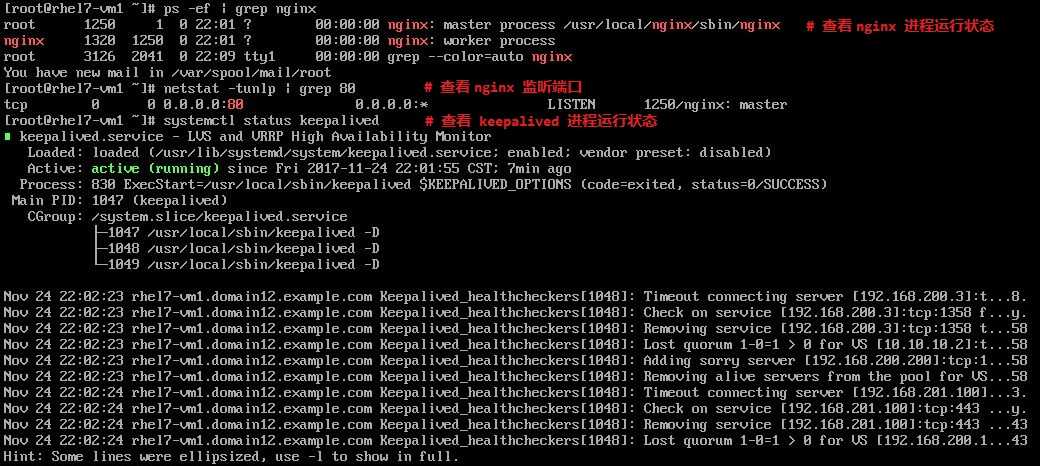Nginx + Keepalived(主备模式)实现负载均衡高可用浅析
Posted
tags:
篇首语:本文由小常识网(cha138.com)小编为大家整理,主要介绍了Nginx + Keepalived(主备模式)实现负载均衡高可用浅析相关的知识,希望对你有一定的参考价值。
概述
目前关于负载均衡和高可用的架构方案能找到相当多且详尽的资料,此篇是自己学习相关内容的一个总结,防止将来遗忘再次重新查找资料,也避免踩相同的坑。
此次配置的负载均衡与高可用架构:Nginx + Keepalived(主备模式),nginx 使用反向代理实现七层负载均衡。
众所周知,Nginx 是一款自由的、开源的、高性能HTTP服务器和反向代理服务器,也是一个IMAP、POP3、SMTP代理服务器。
也就是说Nginx本身就可以托管网站(类似于Tomcat一样),进行HTTP服务处理,也可以作为反向代理服务器使用。
Keepalived 是一个基于VRRP协议来实现的服务高可用方案,可以利用其来避免IP单点故障,类似的工具还有heartbeat、corosync、pacemaker。
但是它一般不会单独出现,而是与其它负载均衡技术(如lvs、haproxy、nginx)一起工作来达到集群的高可用。
相关原理对于理解整个架构的工作方式以及之后的troubleshooting都非常重要。
关于负载均衡,Nginx + Keepalived(主备模式)实现负载均衡高可用的架构方式,可参考另一篇相当不错的博客:
http://www.cnblogs.com/kevingrace/p/6138185.html
关于虚拟路由冗余协议(VRRP),可参考:
https://www.cnblogs.com/yechuan/archive/2012/04/17/2453707.html
http://network.51cto.com/art/201309/412163.htm
http://zhaoyuqiang.blog.51cto.com/6328846/1166840/
一.环境说明
系统环境:
4台 Red Hat Enterprise Linux Server release 7.0 (Maipo)
master节点:192.168.0.151/24
backup节点:192.168.0.152/24
虚拟IP(VIP):192.168.0.16
nginx web服务器:192.168.0.153/24
nginx web服务器:192.168.0.154/24
架构示意图:

二.软件版本
Nginx stable version:nginx-1.12.2
Keepalived version:keepalived-1.3.9
三.环境安装部署
4个节点均进行以下操作:
1. 关闭firewalld防火墙,此处将使用iptables防火墙管理软件。
[[email protected] ~]# systemctl stop firewalld # 停止firewalld服务,关闭firewalld防火墙。
[[email protected]-vm1 ~]# systemctl disable firewalld # 取消firewalld开机自启动
2. 关闭selinux
[[email protected] ~]# vim /etc/selinux/config # 配置selinux为permissive模式
...
SELINUX=permissive # 第7行
...
[[email protected] ~]# setenforce 0 # 使selinux即时生效并使开机依然为permissive模式
[[email protected]-vm1 ~]# getenforce # 查看当前selinux模式
Permissive
3. 节点间时间同步并添加入周期性任务中(此处使用的是阿里的ntp时间同步服务器)
[[email protected] ~]# crontab -u root -e
*/1 * * * * root /usr/sbin/ntpdate 120.25.108.11
4. 开启自定义iptables防火墙规则(此处为虚拟机上实验,只配置了一张网卡ens3;实际生产环境还要更加复杂,可以指定多个网卡接口)
[[email protected] ~]# vim iptables_cfg.sh
#!/bin/bash
#
# Edited : 2017.11.12 08:05 by hualf.
# Usage : Used to configure firewall by ‘iptables‘.
#
iptables -F
iptables -P INPUT DROP
iptables -P OUTPUT ACCEPT
iptables -P FORWARD ACCEPT
iptables -I INPUT -i ens3 -m state --state RELATED,ESTABLISHED -j ACCEPT
iptables -A INPUT -i lo -j ACCEPT
iptables -A INPUT -i ens3 -s 192.168.0.0/24 -p icmp -j ACCEPT # 添加icmp协议,能够使用ping命令
iptables -A INPUT -i ens3 -s 192.168.0.0/24 -p tcp --dport 22 -j ACCEPT # 添加ssh服务端口,能够远程登陆
# web service # 添加web服务端口
iptables -A INPUT -i ens3 -p tcp --dport 80 -j ACCEPT # 80端口:master节点与backup节点用于监听nginx负载均衡服务
iptables -A INPUT -i ens3 -p tcp --dport 8080 -j ACCEPT # 8080端口:2个nginx web服务器的监听端口
# dns service and keepalived(vrrp)
iptables -A INPUT -i ens3 -p udp --sport 53 -j ACCEPT # 注意:允许来源为53端口(DNS服务)的数据包进入主机,避免yum安装rpm软件包时无法解析yum源地址!
iptables -A INPUT -i ens3 -p vrrp -j ACCEPT # 注意:添加vrrp协议,确保能使用keepalived主备间的正常通信,否则会发生脑裂! nginx web服务器节点可取消该规则。
service iptables save # 保存防火墙规则使开机自启动
在运行 iptables_cfg.sh 时,出现报错如下:
The service command supports only basic LSB actions (start, stop, restart, try-restart, reload, force-reload, status).
For other actions, please try to use systemctl.
解决方法:
如果之前没有停止firewalld服务的话,将其停止服务并取消开机自启动;安装iptables-services软件包及相关依赖;重启iptables服务,并实现开机自启动。
[[email protected] ~]# systemctl stop firewalld
[[email protected]-vm1 ~]# systemctl disable firewalld
[[email protected]-vm1 ~]# yum install -y iptables-services
[[email protected]-vm1 ~]# systemctl restart iptables
[[email protected] ~]# systemctl enable iptables
再次运行 iptables_cfg.sh 时,防火墙规则被重新定义。
**************************************************************************
master节点:
1. 安装及配置nginx
1)安装 nginx 相关的依赖包
[[email protected] ~]# yum install -y gcc gcc-c++ pcre pcre-devel openssl openssl-devel zlib zlib-devel acpid
依赖包相关说明:
gcc / gcc-c++:gcc编译器,编译nginx需要。
pcre / pcre-devel:Perl 语言兼容正则表达式(Perl Compatible Regular Expressions,用C语言编写的正则表达式函数库),nginx的rewrite模块正则表达式使用。
openssl / openssl-devel:nginx的ssl模块使用。
zlib / zlib-devel:nginx的gzip模块使用。
acpid:电源管理软件包
注意:以上软件包在编译安装nginx时必须安装,否则报错。
2)下载nginx-1.12.2,解压及源码安装
[[email protected] ~]# tar zxvf nginx-1.12.2.tar.gz -C /usr/local # 解压nginx源码包至/usr/local目录中
[[email protected]-vm1 ~]# cd /usr/local/nginx-1.12.2
[[email protected]-vm1 nginx-1.12.2]# ./configure --with-http_ssl_module --with-http_flv_module --with-http_stub_status_module # nginx安装检查配置
... skipping ...
Configuration summary # 列出nginx所需的系统库及配置的相关信息
+ using system PCRE library
+ using system OpenSSL library
+ using system zlib library
nginx path prefix: "/usr/local/nginx"
nginx binary file: "/usr/local/nginx/sbin/nginx"
nginx modules path: "/usr/local/nginx/modules"
nginx configuration prefix: "/usr/local/nginx/conf"
nginx configuration file: "/usr/local/nginx/conf/nginx.conf"
nginx pid file: "/usr/local/nginx/logs/nginx.pid"
nginx error log file: "/usr/local/nginx/logs/error.log"
nginx http access log file: "/usr/local/nginx/logs/access.log"
nginx http client request body temporary files: "client_body_temp"
nginx http proxy temporary files: "proxy_temp"
nginx http fastcgi temporary files: "fastcgi_temp"
nginx http uwsgi temporary files: "uwsgi_temp"
nginx http scgi temporary files: "scgi_temp"
[[email protected] nginx-1.12.2]# make && make install # 编译安装
检查配置完毕,即可编译安装。安装过中一般不会出现报错。
3)配置nginx实现开机自启动
方法一:直接编辑自定义开机启动脚本 /etc/rc.d/rc.local
[[email protected] ~]# cp /usr/local/nginx/sbin/nginx /usr/sbin/
[[email protected] ~]# vim /etc/rc.d/rc.local
#!/bin/bash
# THIS FILE IS ADDED FOR COMPATIBILITY PURPOSES
#
# It is highly advisable to create own systemd services or udev rules
# to run scripts during boot instead of using this file.
#
# In contrast to previous versions due to parallel execution during boot
# this script will NOT be run after all other services.
#
# Please note that you must run ‘chmod +x /etc/rc.d/rc.local‘ to ensure
# that this script will be executed during boot.
touch /var/lock/subsys/local
/usr/local/nginx/sbin/nginx # 将nginx的可执行文件写入开机自定义启动脚本中
[[email protected] ~]# chmod 755 /etc/rc.d/rc.local # 添加可执行权限,实现开机自启动
[[email protected] ~]# ls -lh /etc/rc.d/rc.local -rwxr-xr-x. 1 root root 473 Nov 17 23:51 /etc/rc.d/rc.local
方法二:编辑 /etc/init.d/nginx 脚本(该脚本由nginx官方提供,根据配置进行相应更改),使用chkconfig命令来实现开机自启动。
该方法可以使用 /etc/init.d/nginx {start|stop|status|restart|condrestart|try-restart|reload|force-reload|configtest} 或 service 命令集中式管理。
[[email protected] ~]# vim /etc/init.d/nginx
#!/bin/sh
#
# nginx - this script starts and stops the nginx daemin
#
# chkconfig: - 85 15
# description: Nginx is an HTTP(S) server, HTTP(S) reverse # proxy and IMAP/POP3 proxy server
# processname: nginx
# config: /usr/local/nginx/conf/nginx.conf
# pidfile: /usr/local/nginx/logs/nginx.pid
# Source function library.
. /etc/rc.d/init.d/functions
# Source networking configuration.
. /etc/sysconfig/network
# Check that networking is up.
[ "$NETWORKING" = "no" ] && exit 0
nginx="/usr/local/nginx/sbin/nginx"
prog=$(basename $nginx)
NGINX_CONF_FILE="/usr/local/nginx/conf/nginx.conf"
lockfile=/var/lock/subsys/nginx
start() {
[ -x $nginx ] || exit 5
[ -f $NGINX_CONF_FILE ] || exit 6
echo -n $"Starting $prog: "
daemon $nginx -c $NGINX_CONF_FILE
retval=$?
echo
[ $retval -eq 0 ] && touch $lockfile
return $retval
}
stop() {
echo -n $"Stopping $prog: "
killproc $prog -QUIT
retval=$?
echo
[ $retval -eq 0 ] && rm -f $lockfile
return $retval
}
restart() {
configtest || return $?
stop
start
}
reload() {
configtest || return $?
echo -n $"Reloading $prog: "
killproc $nginx -HUP
RETVAL=$?
echo
}
force_reload() {
restart
}
configtest() {
$nginx -t -c $NGINX_CONF_FILE
}
rh_status() {
status $prog
}
rh_status_q() {
rh_status >/dev/null 2>&1
}
case "$1" in
start)
rh_status_q && exit 0
$1
;;
stop)
rh_status_q || exit 0
$1
;;
restart|configtest)
$1
;;
reload)
rh_status_q || exit 7
$1
;;
force-reload)
force_reload
;;
status)
rh_status
;;
condrestart|try-restart)
rh_status_q || exit 0
;;
*)
echo $"Usage: $0 {start|stop|status|restart|condrestart|try-restart|reload|force-reload|configtest}"
exit 2
esac
[[email protected] ~]# chmod 755 /etc/init.d/nginx
[[email protected] ~]# chkconfig --level 35 nginx on # chkconfig命令更改nginx运行级别,设置开机自启动
[[email protected] ~]# service nginx restart # 重启nginx服务
Restarting nginx (via systemctl): [ OK ]
[[email protected]-vm1 ~]# /etc/init.d/nginx status # 查看nginx服务状态
4)添加nginx系统用户与系统用户组
从安全角度考虑,如果nginx遭受攻击并被获取权限,使用nginx系统用户将降低主机被入侵的风险。也可以使用除root外的其他系统用户与系统用户组。
[[email protected] ~]# groupadd -r nginx # 添加系统用户组nginx
[[email protected]-vm1 ~]# useradd -r -g nginx -M nginx -s /sbin/nologin # -r:添加系统用户nginx;-g:添加到系统用户组nginx;-M:不创建用户家目录;-s:指定登陆的shell为/sbin/nologin(不允许登陆)
5)配置nginx反向代理与负载均衡
此次的配置文件使用基本的反向代理与负载均衡,较为详细的配置文件说明可参考:
https://segmentfault.com/a/1190000002797601
[[email protected] ~]# vim /usr/local/nginx/conf/nginx.conf
user nginx nginx; # 使用nginx系统用户与nginx系统用户组
worker_processes 4; # nginx对外提供web服务时的worker进程数,通常设置成与cpu的核心数相等
error_log logs/error.log;
#error_log logs/error.log notice;
#error_log logs/error.log info;
pid logs/nginx.pid;
events {
use epoll; # 使用epoll事件模型;epoll是多路复用IO(I/O Multiplexing)的一种方式,仅用于linux2.6以上内核,可以大大提高nginx的性能。
worker_connections 1024; # 每一个worker进程能并发处理(发起)的最大连接数(包含与客户端或后端被代理服务器间等所有连接数)。
}
http { # http全局块
include mime.types;
default_type application/octet-stream;
#log_format main ‘$remote_addr - $remote_user [$time_local] "$request" ‘
# ‘$status $body_bytes_sent "$http_referer" ‘
# ‘"$http_user_agent" "$http_x_forwarded_for"‘;
#access_log logs/access.log main;
sendfile on;
#tcp_nopush on;
#keepalive_timeout 0;
keepalive_timeout 65;
#gzip on;
upstream nginx-static.com { # 加载负载均衡模块;域名指向后端web服务器集群
# ip_hash; # 默认情况下使用轮询(round-robin)模式,也可配置为ip_hash模式
server 192.168.0.153:8080 max_fails=3 fail_timeout=30s; # max_fails: 允许失败的次数,默认值为1
server 192.168.0.154:8080 max_fails=3 fail_timeout=30s; # fail_timeout: 当max_fails次失败后,暂停将请求分发到后端web服务器的时间
}
server {
listen 80; # 监听master负载均衡节点80端口
server_name lb-ngx.com; # master负载均衡节点的域名
charset utf-8; # 使用utf-8字符串编码格式
root /var/www; # 定义nginx服务的根目录: /var/www
#access_log logs/host.access.log main;
location / {
# index index.html index.htm; # 定义首页索引文件的名称,即/var/www下的索引文件。
proxy_pass http://nginx-static.com; # 加载反向代理模块: 将访问http://lb-ngx.com根目录文件的请求,全部代理分发到后端服务器。
proxy_redirect off;
proxy_set_header Host $host;
proxy_set_header REMOTE-HOST $remote_addr;
proxy_set_header X-Real-IP $remote_addr;
proxy_set_header X-Forwarder-For $proxy_add_x_forwarded_for;
proxy_connect_timeout 300;
proxy_send_timeout 300;
proxy_read_timeout 600;
proxy_buffer_size 256k;
proxy_buffers 4 256k;
proxy_busy_buffers_size 256k;
proxy_temp_file_write_size 256k;
proxy_next_upstream error timeout invalid_header http_500 http_503 http_404;
proxy_max_temp_file_size 128m;
}
location /test {
proxy_pass http://nginx-static.com/test; # 加载反向代理模块: 将访问http://lb-ngx.com/test的请求,全部代理分发到后端服务器。
proxy_redirect off;
proxy_set_header Host $host;
proxy_set_header REMOTE-HOST $remote_addr;
proxy_set_header X-Real-IP $remote_addr;
proxy_set_header X-Forwarder-For $proxy_add_x_forwarded_for;
}
#error_page 404 /404.html;
# redirect server error pages to the static page /50x.html
#
error_page 500 502 503 504 /50x.html; # 错误页面
location = /50x.html {
root html;
}
}
6)重启nginx服务使配置生效,查看nginx运行状态及端口使用。
[[email protected] ~]# /etc/init.d/nginx restart
Restarting nginx (via systemctl): [ OK ]
[[email protected]-vm1 ~]# /etc/init.d/nginx status
[[email protected] ~]# netstat -tunlp | grep 80
2. 安装及配置keepalived
1)下载并解压keepalived-1.3.9
[[email protected]m1 ~]# tar zxvf keepalived-1.3.9.tar.gz
2)编译安装keepalived及安装排错
[[email protected] ~]# cd keepalived-1.3.9
[[email protected]-vm1 keepalived-1.3.9]# ./configure
检查配置过程中报错如下:
*** WARNING - this build will not support IPVS with IPv6. Please install libnl/libnl-3 dev libraries to support IPv6 with IPVS.
解决方法:
[[email protected]1 ~]# yum install -y libnl libnl-devel # 安装libnl及libnl-deve依赖包
再次检查配置./configure,报错如下:
configure: error: libnfnetlink headers missing
解决方法:
[[email protected] ~]# yum install -y libnfnetlink-devel
编译安装:
[[email protected] keepalived-1.3.9]# ./configure
[[email protected]-vm1 keepalived-1.3.9]# make && make install
[[email protected] ~]# cp /usr/local/keepalived-1.3.9/keepalived/keepalived /usr/sbin # 拷贝keepalived可执行文件
[[email protected] ~]# cp /usr/local/keepalived-1.3.9/keepalived/etc/sysconfig/keepalived /etc/sysconfig # 拷贝keepalived的systemctl配置文件,可由systemctl命令控制
[[email protected] ~]# cp -r /usr/local/keepalived-1.3.9/keepalived/etc/keepalived /etc # 拷贝keepalived的全部配置文件,否则配置完keepalived并启动将报错
3)keepalived高可用基本配置
keepalived的高可用通过vrrp的虚拟IP(VIP)来实现。
keepalived可以通过自定义脚本来跟踪nginx负载均衡服务的状态。当master节点的nginx负载均衡服务down掉后,可通过脚本结束keepalived进程。
此时backup节点的keepalived侦测到原master节点的keepalived进程已停止,master节点的VIP漂移到backup节点上,即backup节点的keepalived由BACKUP状态转换为MASTER状态。
[[email protected] ~]# vim /etc/keepalived/keepalived.conf
! Configuration File for keepalived
global_defs {
notification_email {
# [email protected]
# [email protected]
# [email protected]
}
notification_email_from [email protected]
# smtp_server 192.168.200.1
# smtp_connect_timeout 30
router_id LVS_DEVEL
vrrp_skip_check_adv_addr
vrrp_strict
vrrp_garp_interval 0
vrrp_gna_interval 0
}
vrrp_script chk_http_port { # vrrp_script定义脚本检测nginx服务是否在运行
script "/opt/chk_ngx.sh" # 自定义脚本所在的路径,并将脚本添加可执行权限。
interval 2 # 脚本执行的时间间隔;此处为2s检查一次
weight -5 # 脚本结果导致的优先级变更
fall 2 # 检测2次失败才算是真的失败
rise 1 # 检测1次成功就算是真的成功
}
vrrp_instance VI_1 { # vrrp实例;keepalived的virtual_router_id中priority(0-255)最大的成为MASTER,也就是接管虚拟IP(VIP)
state MASTER # 指定keepalived的状态为MASTER,但决定MASTER状态的为priority参数,该参数的权限值需要比BACKUP节点的设的要高,才能成为真正的MASTER,否则会被BACKUP抢占。
interface ens3 # 侦听HA的网卡接口,防火墙规则需对该网卡指定vrrp协议。
virtual_router_id 51 # 虚拟路由标志,该标志是一个数字;在同一个vrrp实例中使用同一个标志,即同一个vrrp实例中的MASTER和BACKUP使用相同的virtual_router_id。
priority 100 # 配置优先级;在同一个vrrp实例中,MASTER的优先级必须大于BACKUP的优先级,否则即使state定义为MASTER,也会被优先级定义更高的BACKUP所抢占。
advert_int 1 # 配置MASTER与BACKUP节点间互相检查的时间间隔,单位是秒。
authentication { # 配置MASTER和BACKUP的验证类型和密码,两者必须一样。
auth_type PASS # 配置vrrp验证类型,主要有PASS和AH两种。
auth_pass 1111 # 配置vrrp验证密码,在同一个vrrp_instance下,MASTER和BACKUP必须使用相同的密码才能正常通信。
}
virtual_ipaddress { # vrrp虚拟IP(VIP),如果有多个VIP的话,可以写成多行。
192.168.0.16/24
}
track_script {
chk_http_port # 引用vrrp_script中定义的脚本,定时运行,可实现MASTER和BACKUP间的切换。
}
}
[[email protected] ~]# vim /opt/chk_ngx.sh # 监测nginx负载均衡服务的脚本,可根据nginx进程状态来切换keepalived的状态。
#!/bin/bash
#
# Edited : 2017.11.12 16:16 by hualf.
# Usage : checking status of nginx. If nginx has been down,
# master node will restart nginx again. When nginx has started
# failedly, keepalived will be killed, and backup node will
# replace the master node.
#
status=$(ps -C nginx --no-headers | wc -l)
if [ $status -eq 0 ]; then # nginx服务停止后,再次启动nginx。
/usr/local/nginx/sbin/nginx
sleep 2
counter=$(ps -C nginx --no-headers | wc -l)
if [ "${counter}" -eq 0 ]; then # nginx再次启动失败后,停止master节点的keepalived,切换并启用backup节点。
systemctl stop keepalived
fi
fi
4)查看nginx及keepalived进程运行状态
在master节点上均已开启nginx及keepalived服务,keepalived此时为MASTER状态并与backup节点保持通信。
master节点的虚拟IP(VIP)只能通过ip addr命令查看,无法使用ifconfig命令查看。


********************************************************************************
backup节点:
1. 安装及配置nginx
与master节点方法类似,参照master节点配置。
2. keepalived高可用基本配置
配置文件中只列出与master节点的差异项
! Configuration File for keepalived
global_defs {
notification_email {
# [email protected]
# [email protected]
# [email protected]
}
notification_email_from [email protected]
# smtp_server 192.168.200.1
# smtp_connect_timeout 30
router_id LVS_DEVEL
vrrp_skip_check_adv_addr
vrrp_strict
vrrp_garp_interval 0
vrrp_gna_interval 0
}
vrrp_script chk_http_port {
script "/opt/chk_ngx.sh"
interval 2
weight -5
fall 2
rise 1
}
vrrp_instance VI_1 {
state BACKUP # backup节点的keepalived状态必须配置为BACKUP
interface ens3
virtual_router_id 51 # 在同一个vrrp实例中,master节点与backup节点的virtual_router_id必须相同。
priority 50 # backup节点的优先级必须小于master节点的优先级
advert_int 1
authentication {
auth_type PASS
auth_pass 1111
}
virtual_ipaddress {
192.168.0.16/24
}
track_script {
chk_http_port
}
}
3. 重启nginx及keepalived服务
********************************************************************************
2个节点nginx web服务器:
1. 安装及配置nginx(以192.168.0.153/24为例)
安装与master节点方法相似,具体配置如下:
[[email protected] ~]# vim /usr/local/nginx/conf/nginx.conf
user nginx nginx;
worker_processes 2;
error_log logs/error.log;
#error_log logs/error.log notice;
#error_log logs/error.log info;
pid logs/nginx.pid;
events {
use epoll;
worker_connections 1024;
}
http {
include mime.types;
default_type application/octet-stream;
#log_format main ‘$remote_addr - $remote_user [$time_local] "$request" ‘
# ‘$status $body_bytes_sent "$http_referer" ‘
# ‘"$http_user_agent" "$http_x_forwarded_for"‘;
#access_log logs/access.log main;
sendfile on;
#tcp_nopush on;
#keepalive_timeout 0;
keepalive_timeout 65;
#gzip on;
server {
listen 8080; # nginx web服务器监听8080端口
server_name 192.168.0.153;
charset utf-8;
root /var/www; # 配置虚拟主机的根目录: /var/www
#access_log logs/host.access.log main;
location / { # 根目录中首页的索引文件
index index.html index.htm;
}
location /test { # 根目录中test子目录首页的索引文件
index index.html;
}
#error_page 404 /404.html;
# redirect server error pages to the static page /50x.html
#
error_page 500 502 503 504 /50x.html;
location = /50x.html {
root html;
}
}
[[email protected] ~]# vim /var/www/index.html
<html>
<head>
<title>Welcome to nginx!</title>
</head>
<body bgcolor="white" text="black">
<center>
<h1>Welcome to nginx! 192.168.0.153</h1>
</center>
</body>
</html>
[[email protected] ~]# vim /var/www/test/index.html
<html>
<head>
<title>Welcome to nginx!</title>
</head>
<body bgcolor="white" text="black">
<center>
<h1>Welcome to <A style="color:red;">test</A> nginx! 192.168.0.153</h1>
</center>
</body>
</html>
2. 重启nginx服务
2个nginx web服务器配置完成并重启后,进行负载均衡与高可用测试。
********************************************************************************
负载均衡和高可用测试:
1. 当master节点的nginx及keepalived均正常提供服务时,在此次配置中nginx负载均衡使用轮询模式,即192.168.0.153/24与192.168.0.154/24能够以相似的几率被访问。
master节点的keepalived为MASTER状态,虚拟IP(VIP)在master节点上。
通过浏览器访问http://lb-ngx.com与http://lb-ngx.com/test,分别能够访问位于153站点及154站点上的主页,并且通过刷新能够轮询访问两个站点。




2. 当master节点的nginx负载均衡服务停止,并且再次尝试重启失败后,keepalived进程也被停止,此时由backup节点来接管master节点的nginx负载均衡服务,backup节点keepalived
状态转变为MASTER,虚拟IP(VIP)漂移到了backup节点上。通过浏览器访问上述网站依然能够访问,在这里不再展示。可以通过查看日志/var/log/messages来确定master节点与backup节点
keepalived的状态。

至此,Nginx + Keepalived(主备模式)的负载均衡高可用架构的基本配置已完成,该架构属于轻量级负载均衡高可用架构。之后还会学习haproxy/pacemaker的原理及配置方法。
以上是关于Nginx + Keepalived(主备模式)实现负载均衡高可用浅析的主要内容,如果未能解决你的问题,请参考以下文章
Linux搭建nginx+keepalived 高可用(主备+双主模式)
keepalived+nginx+apache主备及双活搭建测试